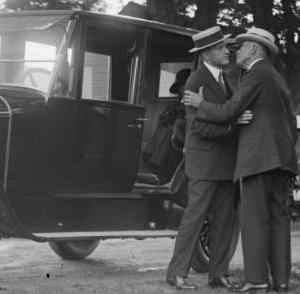
Defying conventional ideas of paternal displays of affection, John Coolidge (right) kisses his son the President. (Boston Public Library)
There was a homeopath who adored his son and a tanner who exploited his. Two were humble farmers offering practical advice that charmed the nation. Three were diplomats, two being Ambassadors to Great Britain, one of them being the first to serve in such a role, and one was the first American representative to communist China. They were the seven fathers who lived long enough to see their sons lead the nation as presidents of the United States. The very first one and the most recent one were even Presidents themselves.
John Adams, 1735-1826
father of John Quincy Adams, president from 1825-1829
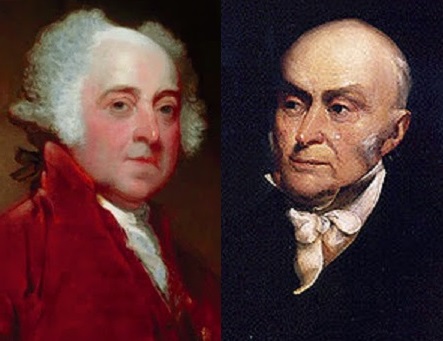
Sixth President John Quincy Adams and his father, second President John Adams.
The second President of the United States had specifically raised his eldest son John Quincy with the very intention of following him in public service.
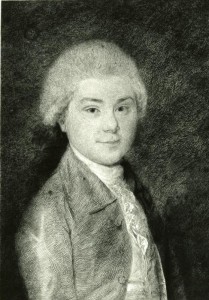
Young JQA.
When John Adams undertook various diplomatic mission from 1778 until 1785, he took young “Johnny” as his aide.
Despite being so closely associated with his father, by the time he was elected President in 1824, John Quincy Adams had broken from the political and religious traditions of the widowed former President, switching from Federalist to Democratic-Republican and a liberal Unitarianism to a more Scripture-based branch of the sect.
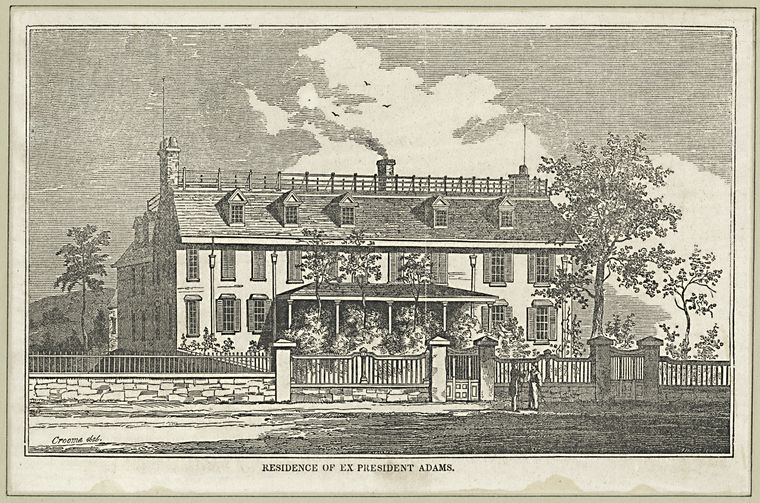
The Massachusetts home of John Adams and John Quincy Adams.
By then, John Adams was more interested in repairing his stone garden walls than mending political fences, living in contented retirement at the multi-generational Massachusetts home they shared.
He mused over the fact that so many of the contentious issues his son faced were the same basic ones he too encountered a quarter of a century before: “Poor human nature, disputes in religion and dissensions in politics without end.”
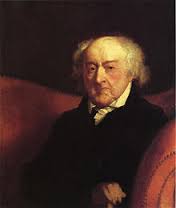
Old JA.
When the second President famously died on July 4, 1826, the 50th anniversary of the signing of the Declaration of Independence being signed, and the same day as his fellow founding father and former president Thomas Jefferson, “JQA” was hosting a July Fourth public reception at the White House.
Still, there was enough of the second in the sixth: Defeated in his 1828 re-election bid by Andrew Jackson, John Quincy Adams refused to appear at his successor’s inauguration, just as John Adams had done when Jefferson beat him, in 1800.
Nathaniel Fillmore, 1771-1863
father of Millard Fillmore, president from 1849-1853
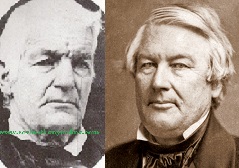
Nathaniel Fillmore and his son Millard, the President.
It was to fulfill a promise he made to his granddaughter Abby that he would come stay a spell with her and the folks in their new home that led Nathaniel Fillmore to become the first First Father to visit his son the President in the White House.
Making the trip from his home in rural Upstate New York, “Old Nat,” as the press dubbed him, became an instant sensation with the press, who detailed his amazing physical condition as if the aged farmer were the latest exhibit at P.T. Barnum’s museum of natural wonders. He was said to still gather apples and tap maple trees in the bitter cold of winter with gusto.
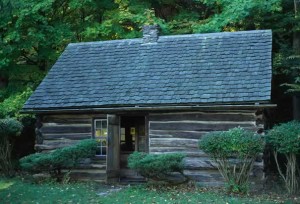
A recreation of the Fillmore log cabin.
When word got out that Fillmore’s father had agreed to meet the public at an open house reception alongside his son and daughter-in-law, the Washington elite flocked to stare in wonder at this specimen of long-term pioneer living.
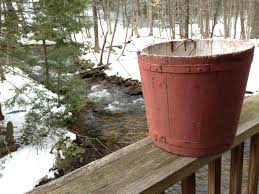
Ye old sap bucket.
Despite having lived exposed to the elements, Fillmore Senior at age TK was a modern marvel of senior health, standing tall with his ramrod straight posture, ruddy-complexion, and thick full mane of white hair.
When a woman approached to ask how she could raise her son to be President like his own, the First Father’s clear blue eyes twinkled.
“Cradle him in an old sap bucket!” Old Nat crisply advised.
Jesse Grant, 1794-1873
father of Ulysses S. Grant, president from 1869-1877
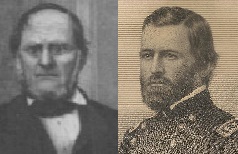
Jesse Grant, a tanner, who rarely voiced approval for his son Ulysses.
When he was down and out, his father offered nothing but criticism. When he was up and happy, he tried to get in on the action.
Never did a dad meddle like tanner Jesse Grant. Early in his son’s military career, when Ulysses S. Grant decided to resign from the Army, his father wrote the Secretary of War requesting that it only be for a leave of absence.
During the Civil War, he implored his son to buy military supplies from a friend, appoint another friend to a lucrative government position and get himself an army commission.
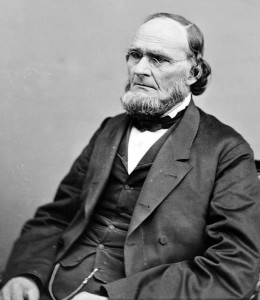
Father Grant.
When no invitation to his son’s inauguration was forthcoming, he wrote the brother of his daughter-in-law demanding rooms be provided to him and his wife in a private home.
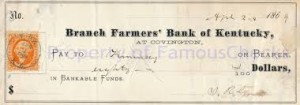
A check signed by the President’s father,.
No arrangements were made for old Mr. Grant but he showed up for the ceremonies anyway.
And he kept showing up, even when no room at the White House was made available to him. Instead, he hobbled on a crutch from his cheap hotel room to the presidential mansion to meet his son for lunch or take a carriage ride.
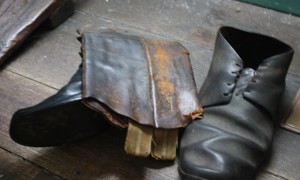
A pair of shoes crafted by Jesse Grant, the President’s father.
All the while, he was advertising for investors in his get-rich-quick schemes by printing the fact that he was “father of the President.”
While he’d learned to never quite trust his dad, Ulysses Grant insisted that his father must have been influenced to be so exploitive by someone else. “I do not think Father, of his own accord,” Grant wrote, perhaps naively, “would do me injustice.”
Like John Adams, Jesse Grant died during his son’s presidency.
George Harding, 1844-1928
father of Warren G. Harding, president from 1921-1923
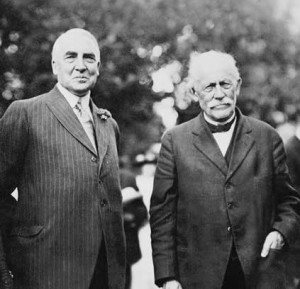
Warren G. Harding and his dad, Dr. George Harding.
Always affable, the gentle touch of small-town homeopath George Harding never tired of telling the world just what a “good boy” his son President Warren Harding had always been.
After the pomp and show of the 1921 Inauguration, the senior Harding returned home to Ohio, happy to sign autographs for the curious or chat up reporters looking for a quote.
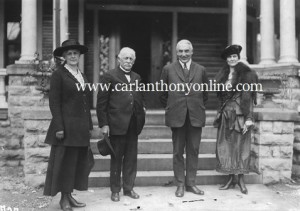
George Harding with three of his children, Carolyn, Warren and Daisy, in front of the famous front porch, where his son’s presidential campaign was conducted.
And he often pointed out how proud he was not only of his other son, a physician, but his daughters who were a social service provider and housewives. He was also especially close to his daughter-in-law Florence and spoke proudly of her capabilities in a way which seemed to understandably reflect on the strains within her marriage.
Dr. Harding’s warmth towards all he encountered and trusting perspective of the world reflected a hardened integrity but also a naiveté which made headlines.
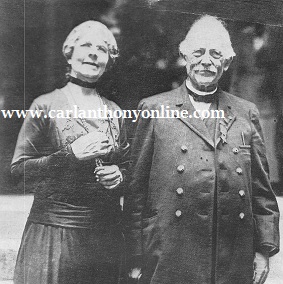
George Harding dressed in his GAR uniform with his daughter-in-law Florence.
He happily accepted offers of free train passes and hotel suites and after being lavishly feted by Des Moines Democrats, he endorsed that party’s candidate for the U.S. Senate – against his son’s support of the Republican candidate.
He famously made reference to his son’s adulterous proclivities when trying to explain that Warren was disinclined to deny others what they sought.
“It’s a good thing you weren’t born a girl,” Doc Harding told his son, “otherwise, you’d always be in a ‘family way.'”
When the widowed Doc Harding stunned the nation – and his son, by eloping with a third wife, he took ten years off his own age and applied it to his young wife’s age on their marriage license.
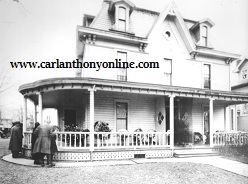
The Marion, Ohio home of George Harding.
One of the greatest moments of his life, the President told his wife’s confidante Evalyn McLean, was being able to have his father parade with him and figures like General Pershing in an open car through the streets of Marion during the town’s 1922 centennial celebration.
George Harding became the first of two First Fathers who sadly outlived their presidential sons. When the late President Warren Harding’s coffin was returned home to Marion in 1923, it was placed in the home of his father, where the home folk streamed through to pay their final respects.
John Coolidge, 1845-1926
father of Calvin Coolidge, president from 1923 to 1929
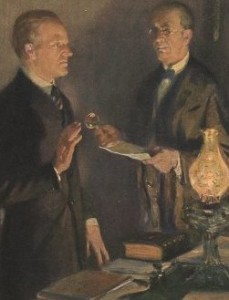
Calvin Coolidge being sworn in as president by his father, accurately depicted in a painting.
He might not have been the first First Dad to see his son become President, but John Coolidge not only witnessed Calvin Coolidge take the oath of office – he administered it.
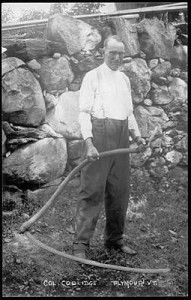
First Father Coolidge working on his Vermont farm. (Boston Public Library)
In the wee hours of August 3, 1923, after receiving word that President Harding had suddenly died, Vice President Coolidge was sworn into office in the family’s Vermont farmhouse parlor by John Coolidge his father, in his capacity as a notary public.
A sophisticated man who had held both state and local office, this First Father was nevertheless cast by the popular press as a laconic Yankee farmer, progenitor of his son’s famous ability to use as few words as possible.
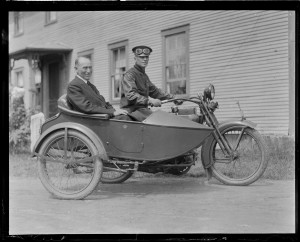
First Father John Coolidge takes a ride with a Boston policeman. (Boston Public Library)
On occasion, he gave the public fodder to make this believable.
In 1924, for example, he turned down an invitation to headline a fundraising dinner for his son’s re-election campaign in five words:
“Gentleman. Can’t come. Thank you.”
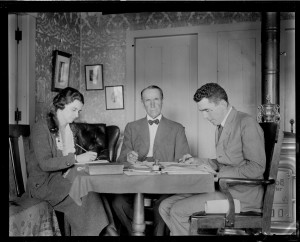
Involved in local politics, John Coolidge seated with two townspeople in the parlor where he swore his son in as President,
And “Colonel Coolidge,” as he was called, was onto the press. When a friend asked how he felt after undergoing prostrate surgery, the wry senior cracked that he’d “have to read the papers to find out.”
The President maintained an extraordinarily tender relationship with his dad, belying the media personae of them as remote men. They hugged and kissed without self-consciousness in front of others, including strangers.
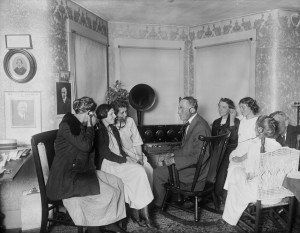
John Coolidge with friends listen by radio to his son’s acceptance speech of the 1924 Republican nomination for President from his Vermont farmhouse.
“My father had qualities that were greater than any I possess…untiring industry and great tenacity of purpose…unerring judgement. He would be classed as decidedly a man of character.”
John Coolidge swelled with enormous pride and confidence in his son’s abilities to serve the nation: “I think of him as just a good and honest boy, who will do his best with any job given him. He always has been that way and I guess he always will be. A trusty kind of boy who always attended to whatever he had in hand.
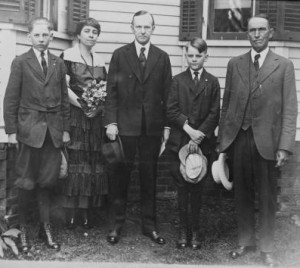
John Coolidge, far right, with his son Calvin, daughter-in-law Grace and grandsons John and Cal, before the presidency.
Like John Adams and Jesse Grant, John Coolidge died during his son’s presidency.
Although he made a few visits to the White House, he refused to move there with his family, even after he became terminally ill. The President spoke to him by phone every day through a direct telephone line wired from the executive mansion in Washington to the farmhouse in Vermont.
“I think only two or three fathers have seen their sons chosen to be president,” Calvin Coolidge wrote in a note to John Coolidge, “I am sure I came to it largely by your bringing up and by your example. If that was what you wanted, you have much to be thankful for that you have lived to so great an age to see it.”
Joseph P. Kennedy, 1888-1969
father of John F. Kennedy, president from 1961-1963
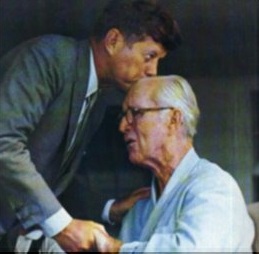
President John F. Kennedy kisses his disabled father Joseph P. Kennedy.
Controversial, ambitious, powerful and dynamic, “Joe,” as he was known in national Democratic circles had been a force to contend with ever since serving as President Franklin D. Roosevelt’s Ambassador to Great Britain.
From that position he was fired after speaking out against FDR’s war preparedness plans to aid ally England against the ominously rising tide of Hitler’s menacing Third Reich.
Rejected from the privileged circles of old New England, this grandson of Irish Catholic immigrants was determined to have a son elected President.
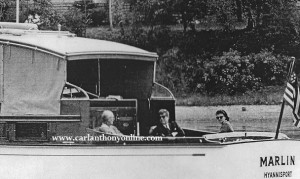
President Kennedy out for a cruise with his father Joe on October 21, 1963, just one month before his assassination.
After the death of his eldest and namesake, it was second son John, known as Jack, who carried the torch. “I got Jack into politics. I was the one,” Joe bragged. “He didn’t want it. He felt he didn’t have the ability.”
The President conceded as much: “My gather wanted his eldest son in politics. Wanted isn’t the right word. He demanded it.”
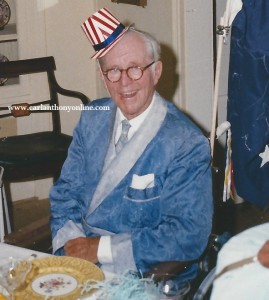
Patriarch of the Kennedy clan, former Ambassador to England, Joe Kennedy smiles at his birthday dinner.
Joe Kennedy threatened to become, however, the first father of a presidential candidate who could become a factor working against his son’s victory.
It was the rumor that he was using his great wealth to buy votes to elect his son that lingered as the greatest potential harm.
“It’s not the Pope I’m worried about,” piped up former President Harry Truman when asked if it was Catholicism which made him reluctant to endorse JFK’s candidacy, “it’s the Pop.”
He took his son’s advice and did not appear at the 1960 Democratic Convention which nominated JFK, a moment the senior man had been anticipating his whole life.
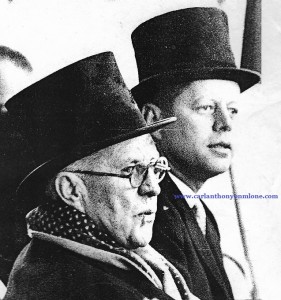
President Kennedy reviewing his Inaugural Parade with his father, former Ambassador to Great Britain Joseph P. Kennedy.
Only on Election and Inauguration Days was Joe Kennedy permitted to be photographed with his son.
After that, the businessman worth $250 million was at loose ends.
“Hell, I don’t know how it feels to be the father of the President,” he snapped to a reporter. “Jack doesn’t belong any more to one family. He belongs to the country…I want to help, but I don’t want to be a nuisance.”
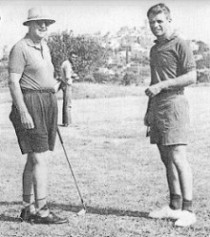
Joe Kennedy with his son Bobby on the golf course.
Joe Kennedy did succeed in advising JFK to retain his friend J. Edgar Hoover as FBI chief, and Allen Dulles as CIA head. “It’s the only thing I’m asking for,” he said about having his second son Robert named Attorney-General, “and I want it.”
He failed, however, to get his son to name a friend as a federal district court judge and dismiss the tax problems of a second crony.
After JFK’s famous showdown with U.S. Steel led to a drop in the stock market, Joe Kennedy cracked, “And to think – I voted for that son-of-a-bitch!”
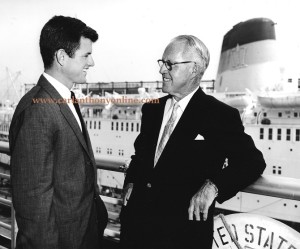
Joe Kennedy with his youngest son Teddy.
“Do you always agree with your father? No. But you love him,” the President told a reporter point-blank who was seeking to determine if Joe was pulling strings behind the scene.
For the President’s first summer at the family compound, Joe bought a special golf cart to help his son get around, in light of his troubled back.
Still, he relished taking down the President a bit in public, as only a father could. “When he comes over to use my [New York] apartment,” the First Father told Time magazine, “he still takes my socks…”
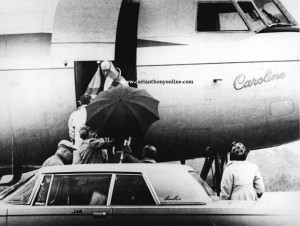
Joe Kennedy is lowered from the family plane, draped in a blanket.
Before his son had even completed a full year as president, Joe Kennedy suffered a stroke which rendered him permanently unable to walk or speak.
It was especially devastating to the President who would call his father several times a day sometimes to seek his views.
Initially uncomfortable about how to communicate, JFK learned to just continue verbally expressing himself knowing that while his father could not intelligibly respond, that he could comprehend everything.
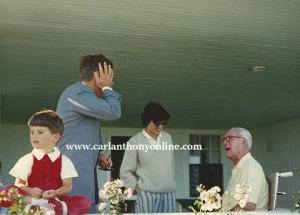
President Kennedy gestures to communicate with his father.
Coaxed by his wife’s lead, when he was with his father, the President quickly adapted.
He came to use gestures and to also patiently wait to permit his father to utter what came out as just a moan-type sound, but which he realized was the older man’s effort to show he had a response.
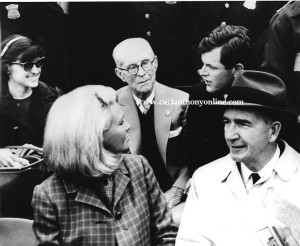
Joe Kennedy seated between his niece Ann Gargan, son Senator Teddy Kennedy, with daughter-in-law Joan, JFK Library director Dave Powers at a Boston Red Sox game shortly before his death.
From that point on, until his death in 1969, Joe Kennedy was confined to a wheelchair, cared for by an unmarried niece Ann Gargan.
Still, the patriarch was always included in family events and even taken out to public places, such as a Red Sox game by his son and daughter-in-law Senator Teddy and Joan Kennedy.
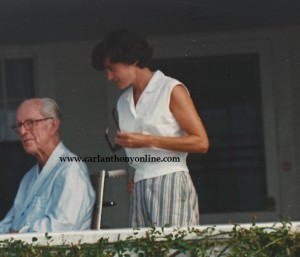
Joe Kennedy on August 25, 1963, watching his son the President depart from his Hyannis Port front porch.
More than anything Joe Kennedy came to anticipate the summer and autumn visits in 1962 and 1963 of his son the President.
The senior Kennedy was always seated on the broad white front porch overlooking the emerald lawn and snapping flag where Marine One, the presidential helicopter would land and alight.
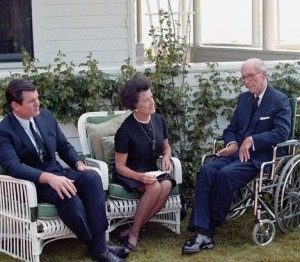
After RFK’s assassination, Teddy and Rose Kennedy gave a television interview while Joe Kennedy sat silently in his wheelchair.
Sometimes for up to an hour, he would sit waiting for his son to arrive and often linger just as long after he had gone.
Joe Kennedy’s condition prevented him from attending the state funeral in Washington of his son Jack.
Nor was he able to attend the funeral held five years later in New York’s St. Patrick’s Cathedral for his son Robert, also assassinated.
He outlived four of his nine children
George Bush, born 1924
father of George W. Bush, president from 2001-2009
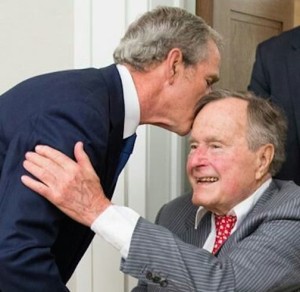
Former President George W. Bush kisses his father former President George H. Bush.
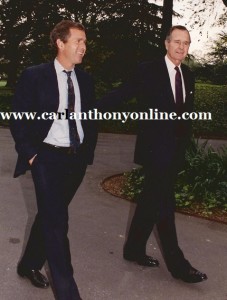
W. walks at White House with his dad during the first Bush presidency.
The son drew directly on the father’s lists of campaign donors and foreign affairs advisers like Colin Powell, Condaleeza Rice, James Baker and Robert Gates, but the father would not interject his ideas and opinions, unless asked.
“As the father of the President, he could provide something different: the love and support I needed to handle the pressure of the job,” observed the 43rd President George W. Bush of his father, the 41st President of the United States.
As the elder would explain, the junior was his child, it was practically impossible to take an objective perspective on him and his policies.
At certain points during the latter Bush Administration, speculation ran rampant that the senior didn’t approve of the controversial decisions his son made regarding the tactical approaches taken in his Iraqi War.
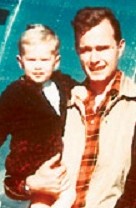
George Bush holding his son George W. just after the family moved to Texas.
In truth, the father never suggested his approval or disapproval of the the policy, only that he trusted and loved his son. It was only later that W. stated his father did not disagree with the way he led the U.S. into Iraq.
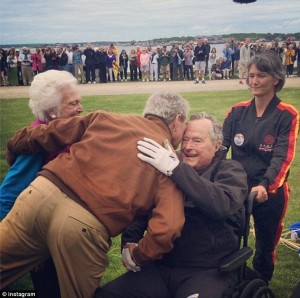
George W. hugs his dad on his 90th birthday.
More importantly, having been a President he understood as only those in that position always seem to do: everyone on the Internet and television can bicker and bitch about any one of them based solely on partisanship, but to be in that role is to understand the complexity and undisclosed pressures often at play on a final decision. It is one reason explaining the unusual degree of closeness, for example, of former President Clinton with both Bushes, George W. and George.
Or just George H. Bush. Or George H.W. Bush. How to make the distinction between the two of them seemed to be a bit of a problem for journalists, historians, curators, commentators and everyone else when the nearly same-named son assumed the position. For some reason, people could accept that there was simply a John Adams with a son who became President who had the same name except for a middle initial “Q,” but that degree of simplicity somehow didn’t jive with the 21st century.
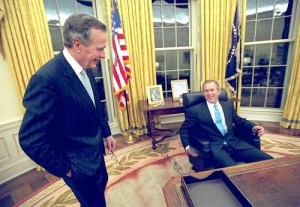
George Bush visits George W. Bush on his first day in the Oval Office.
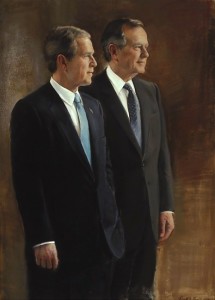
A joint portrait painting of the two Bush presidents. (George Bush Library)
George W. Bush also raised some eyebrows when he remarked that he didn’t need the counsel of his father, but only of God. In 2006, he elaborated on the nature of the relationship between two Presidents who were father and son:
“I love my dad. But he understands what I know; that the level of information I have relative to the level of information most other people have, including himself, is significant and that he trusts me to make decisions. I am the commander-in-chief….[but] Washington can be a tough town at times and there is nothing better than hearing a loving voice on the end of the phone call occasionally, and so I check in…”
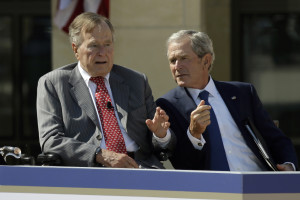
George Bush, who now suffers from a form of Parkinson’s Disease, at his son’s presidential library dedication.
There was one notable exception. When Russian President Vladimir Putin was scheduled to arrive for talks with W. in 2007 about missile defense systems, the latter asked his father for some help in coordinating logistics.
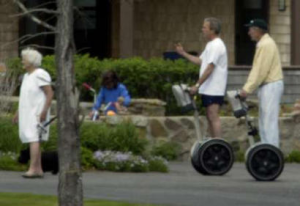
Both Bushs try Segway vehicles at their Maine estate in June 2003.
The senior Bush decided to take his son and Russian counterpart for a speedboat adventure out on the waters of Maine, near the family’s summer estate compound. W. recalled that Putin was “startled by the idea of an eighty-three-year-old former President driving the boat at top speed…”
Perhaps it led to some friendly intimidation with the notoriously wily Putin.
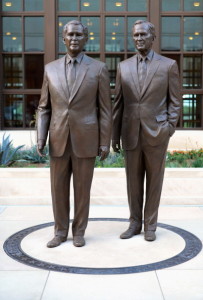
Statues of both Bushes in front of the W. Bush presidential library.
Whatever inevitable tensions that might have arisen between father and son has remained a family secret. W. has gently suggested he “learned” from some of his father’s less stellar moments in office, a budget deal compromising his promise not to raise taxes, shoring up the political base ahead of an election, deeply vetting nominees for office, and firing important senior personnel himself.
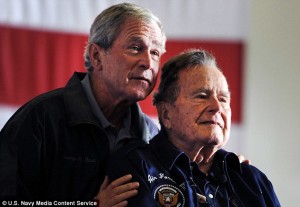
W. with his father at a ceremony honoring the latter.
Despite the family’s pronounced proclivity for avoiding too much internal reflection, there’s no lack of emotional expression among the two men.
Number forty-one is always easy to cry, moved readily by recollections involving family members and number forty-three has no hesitation on showing his father love with strong embraces and kisses.
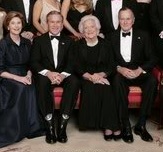
The two Presidents Bush and wives from a larger family photo during 2005 Inauguration.
Unlike John Adams who never visited his son in the White House, George Bush shared all the celebratory moments of his son’s presidency, coming to both inaugurations, spending holidays at Camp David and making numerous overnight stays in his old home.
And while future President Woodrow Wilson did once write a biography of the late President George Washington, W. became the only President to author a biography of one who happened to be his dad, 41: A Portrait of My Father, published last year.
Categories: Father's Day, Presidents, The Adamses, The Bushes, The Coolidges, The Fillmores, The Grants, The Hardings
Tags: Calvin Coolidge, George H. W. Bush, George W. Bush, John Adams, Joseph P. Kennedy, Millard Fillmore, Ulysses S. Grant, Warren Harding
 Jane & Jill, Potential First Ladies: Lots in Common Between the Wives of Joe Biden & Bernie Sanders
Jane & Jill, Potential First Ladies: Lots in Common Between the Wives of Joe Biden & Bernie Sanders  The President as King: A Political Cartoon History
The President as King: A Political Cartoon History  All The Presidents’ Birthdays: Dance Balls to Movie Star Fundraisers in 90 Rare Photos
All The Presidents’ Birthdays: Dance Balls to Movie Star Fundraisers in 90 Rare Photos  Ivana Be First Lady: Trump Wives Tales, A President Who Married His Niece & Other Multiple-Wife Presidencies
Ivana Be First Lady: Trump Wives Tales, A President Who Married His Niece & Other Multiple-Wife Presidencies  Jefferson’s Warning About the Current Man Occupying the Presidency
Jefferson’s Warning About the Current Man Occupying the Presidency  A Dozen First Lady Fourths: Presidential Wives’ Independence Days Radically Diverse
A Dozen First Lady Fourths: Presidential Wives’ Independence Days Radically Diverse
Leave a Reply